The death of a first-year student of Jadavpur University due to alleged ragging on August 9 this year has brought to the fore, yet again, how ragging despite being banned continues to thrive in our country’s institutions.
Rise Against Child Sexual Harm & Abuse (RACSHA) organised a webinar titled ‘Aar Noy…Not Anymore!’ on September 1 to discuss various aspects of ragging and abuse.
The guests of the session were educator and author Barry O’Brien; psychiatrist and joint director of Mental Health Foundation (Kolkata), Dr Jai R. Ram; associate professor and convener of the anti-ragging cell of Gurudas College, Dr Gopa Mukherjee; advocate Reshmi Ghosh; mental health professional, Dr Subhrajyoti Mukherjee and a student representative from Jadavpur University, Rusha Chowdhury.
Sreemoyee Sen Ram, consultant in social care and joint director of Mental Health Foundation (Kolkata), and Priyanka Poddar, clinical psychologist at Mental Health Foundation, (Kolkata) acted as moderators for the session.
A form of abuse
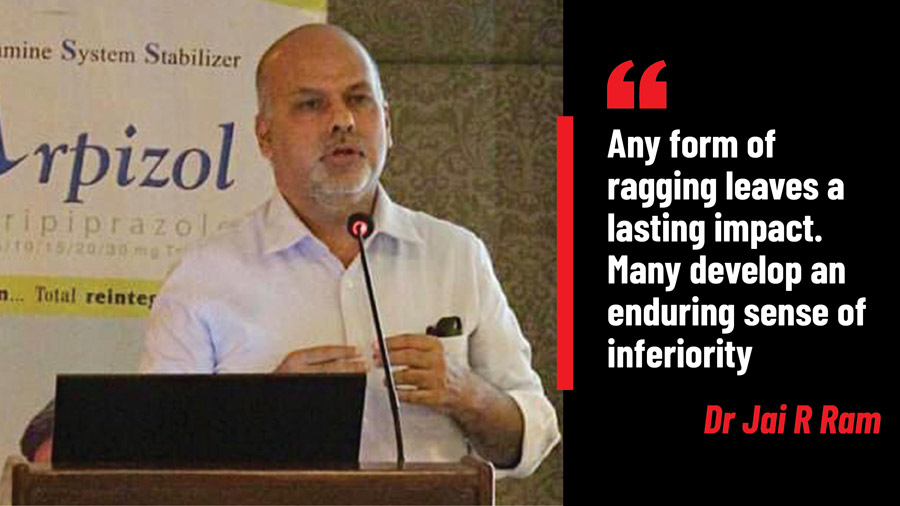
Speaking about ragging, Dr Jai R. Ram underlined that ragging was essentially a form of abuse. “Ragging is undeniably a form of abuse with various manifestations. Essentially, it involves calling a fresher and subjecting him or her to humiliation in front of a group, making one feel small. This abuse can encompass emotional, physical and often sexual humiliation and abuse. Its primary purpose is to demean and establish authority and power. We often mistakenly legitimise such abuse as an initiation ceremony. Any form of ragging leaves a lasting impact. Those with support from parents and friends may eventually recover but many develop an enduring sense of inferiority. They internalise the demeaning messages from the ragging experience and, at times, even contemplate suicide,” Ram said.
There are two sides to this issue. “The outpouring of grief and anger following such incidents is natural, given their tragic nature. However, the institution’s response has been lacking following the latest incident, fueling public anger. The actions of a few bullies have tarnished the university’s reputation, leaving current and former students fearful. Some students now avoid disclosing their university affiliation because of the institution’s negative image. It’s important not to blame all students for the actions of a few,” he explained.
Need for early conversation
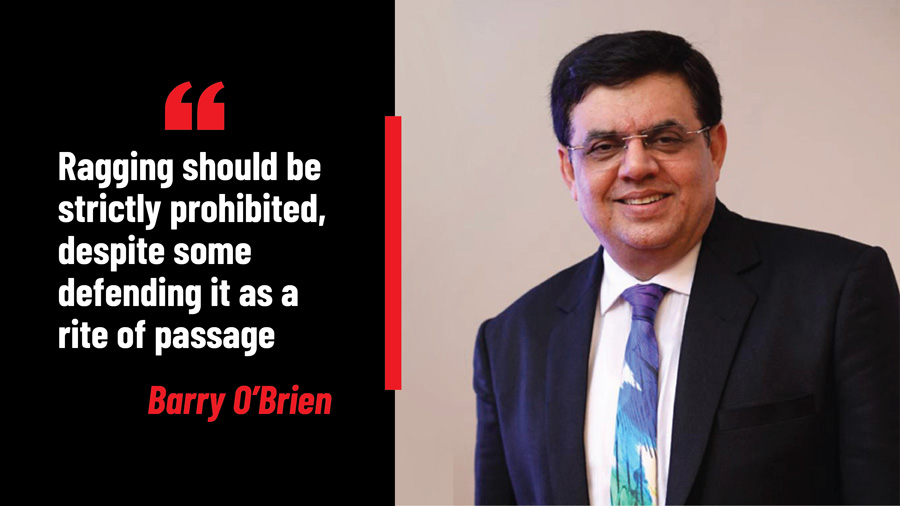
Barry O’Brien said that in India these issues are swept under the carpet and talked about only when a tragedy happens.
“As Indians, we often react impulsively and tend to ignore issues until they escalate. Then, we express sympathy for the affected families. While rules and regulations are necessary, the process should start at a younger age. Authors like me face resistance when writing uncomfortable topics for teachers. We must address these issues both at school and at home. Ragging should be strictly prohibited, despite some defending it as a rite of passage. Sensitisation must start early and it is primarily the responsibility of parents and schools. While video cameras and discipline measures help, some schools neglect value education. Educational institutions, parents and influencers must invest time with children. Some colleges have successfully eliminated ragging, emphasising the importance of instilling these values. Children should develop resilience, confidence and the ability to cope with the world,” he said.
His sentiment was echoed by Dr Subhrajyoti Mukherjee who pointed out that these discussions revolving around power should start early.

“We fail to educate families on handling power. Power should be imparted, and discussions must revolve around how to handle it. For instance, parents often command their children not to use phones, exerting dominance instead of engaging in a reasoned conversation about the downsides. This leads to lapses in the decision-making abilities of children or students when the time comes. They struggle to navigate challenging situations and make choices when they are away from the influence of their parents. People tend to gravitate towards power, but we must instil in children the importance of questioning power and, if entrusted with it, how to responsibly wield it,” he added.
Gender stereotypes also play an important role when it comes to ragging but talking openly about sexuality can help prevent it. “We have a very distorted view of masculinity. We think that aggression has to be a part of masculinity. So we have the tendency to label people who don’t adhere to our notions of what makes a ‘man’ or ‘woman’. Therefore, it is necessary to speak openly about sexuality. Bullying destroys self-confidence and we need to talk about these things early on,” elaborated Mukherjee.
Importance of protests
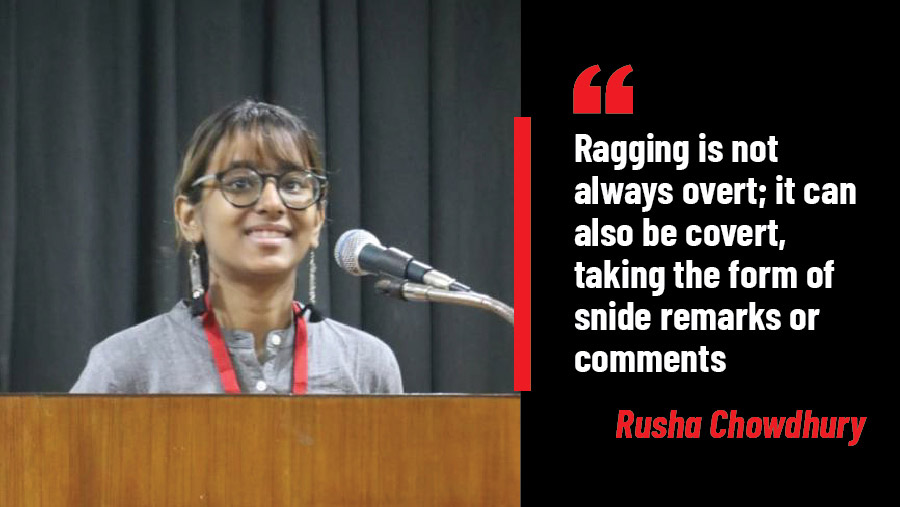
Talking about ragging, Rusha Chowdhury noted that the notion that ragging is a rite of passage needs to change. “Ragging is about power, but often we turn a blind eye to it, even when we don't condone it. We tend to normalise it. Ragging is not always overt; it can also be covert, taking the form of snide remarks or comments. Another important aspect is community and empathy. We grow up with the belief that only certain people deserve our support, but we should embrace the idea that support should be for all, without discrimination,” she said.
But protests also play an important role when helping students vocalise the problems that they face. “Student protests often face pressure from organisations and groups, leading to the misrepresentation of their narratives and agendas. However, I believe that protests are necessary because they inspire others to speak up about their own issues and break their silence. After recent protests, I’ve witnessed many hostel residents opening up about their experiences. We must create a safe environment, as bullying and ragging remain hidden problems. Some young people endure ragging in silence, fearing disappointment from their families if they speak out,” said the student.
Role of institutions
“We have established the anti-ragging committee as per UGC guidelines. The committee’s role extends beyond handling ragging cases; it also involves raising awareness about ragging. When students enter college, they are already adults, but awareness must begin at an earlier age,” said Dr Gopa Mukherjee.
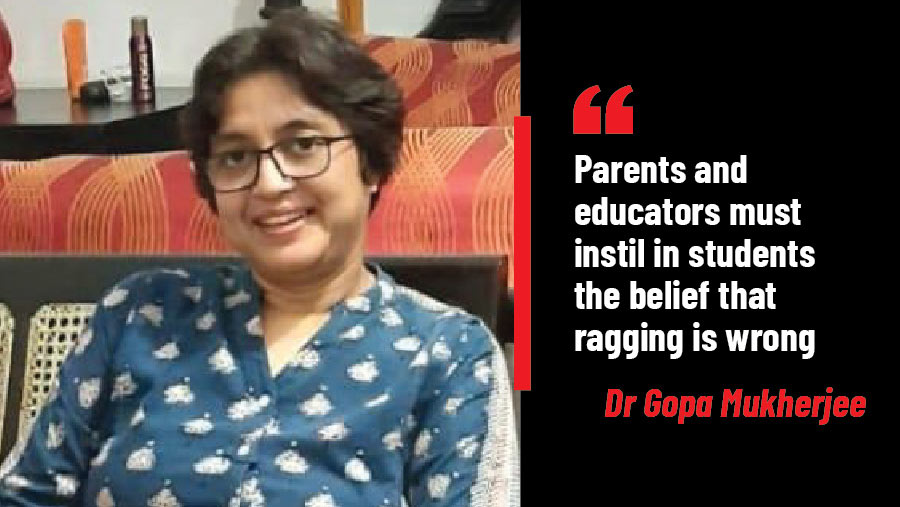
“I recall reading that one of the fathers of the accused in this incident had stated that ragging is normal, and if someone cannot cope with it and dies, it’s their fault. Such comments are unimaginable. Normalising teasing is a troubling attitude. During our awareness programmes, one of the first things we emphasise is that all forms of bullying are unacceptable,” she said.
Some argue that bullying or teasing is harmless fun, but it can only be considered as such when both parties are on an equal footing. “In the presence of a power hierarchy, there can be no harmless teasing or bullying. Parents and educators must instil in students the belief that ragging is wrong, and we ourselves must adopt the same belief regarding any form of bullying. Awareness should not commence after a negative incident occurs. At times, ragging may seem to foster friendships, but it should never be a prerequisite for forming friendships. During our college days, we observed a rural-urban divide, where urban students harassed those from rural areas, and vice-versa. This demonstration of power needs to cease. I believe that student unions should actively promote awareness and intervene in such cases to prevent them.”
Role of law in prevention and punishment
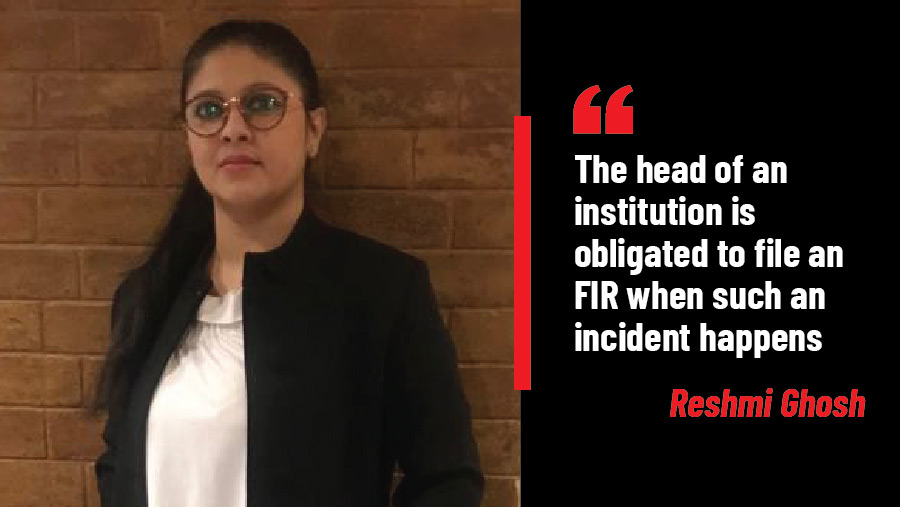
“The Pocso Act (The Protection of Children from Sexual Offences Act, 2012) applies to children up to the age of 18. But ragging typically occurs in colleges and universities among individuals above 18, making the Indian Penal Code applicable. According to UGC guidelines from 2009, when an incident of this nature occurs, the head of the institution is obligated to file an FIR. Additionally, there is another act focused on preventing ragging, reinforcing its prohibition. However, the primary goal should be the elimination of bullying and ragging. When it qualifies as an offence according to the Indian Penal Code, penalties can be implemented corresponding to the severity of the offence,” said advocate Reshmi Ghosh.
The webinar came to a close with the experts answering questions from the audience.
